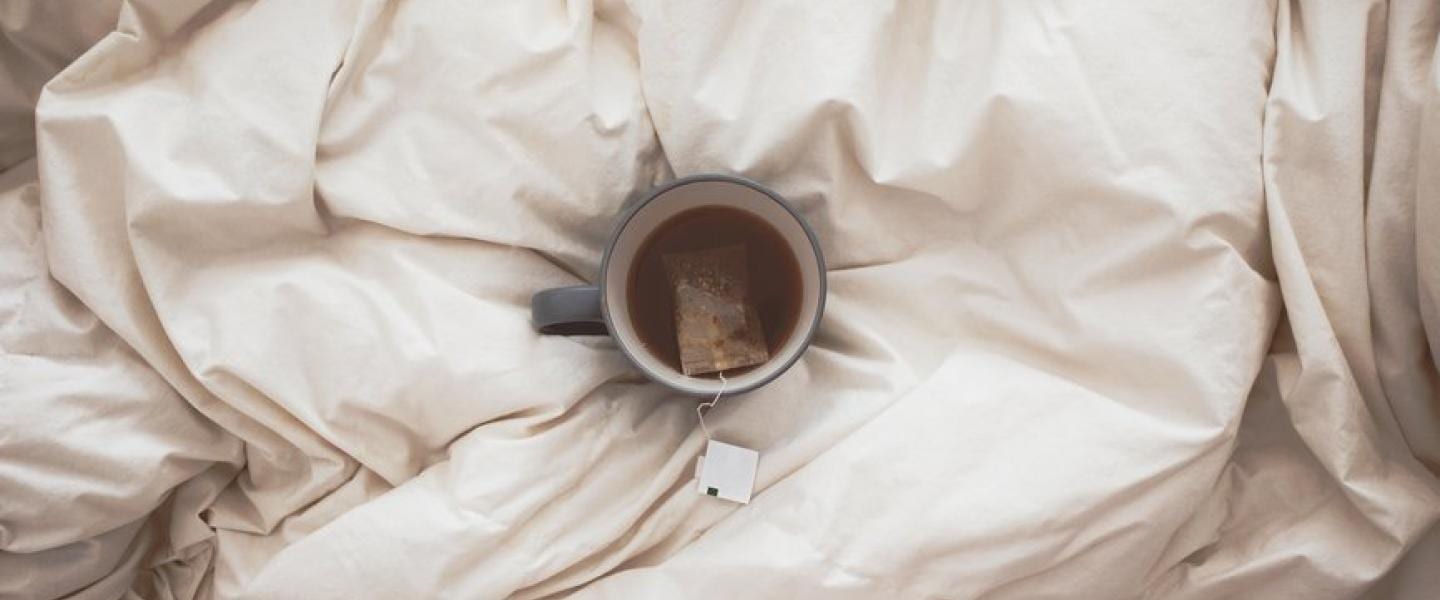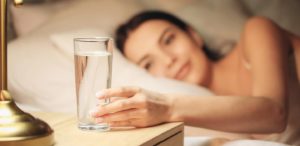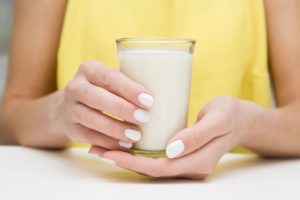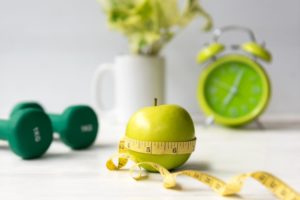When you buy through our links, we may earn a commission. Products or services may be offered by an affiliated entity. Learn more.
Caffeine and Sleep
- Caffeine promotes wakefulness by blocking adenosine, a sleep-inducing chemical.
- Sensitivity to caffeine varies among individuals and depends on how often it is consumed.
- Avoid caffeine at least 8 hours before bedtime to ensure better sleep quality.
- Reduce your daily caffeine intake if you notice insomnia, anxiety, or headaches.
The vast majority of adults consume caffeine daily, with many relying on caffeine’s energizing effects to enhance their mood and optimize their performance. Caffeine is found naturally in many plants, including coffee beans, tea leaves, cacao pods, and kola nuts. Synthetic caffeine is also sometimes added to medications and energy drinks.
While caffeine is a common tool to promote wakefulness in the morning and to ward off sleepiness during the day, it comes with potential side effects, including jitteriness, headaches, and nervousness. It can also interfere with sleep, especially if consumed too late in the day. Data from roughly 160,000 Sleep Foundation profiles shows roughly 88% of people who regularly consume caffeine in the afternoon have also reported at least one sleep problem.
Looking to improve your sleep? Try upgrading your mattress.
How Does Caffeine Affect Sleep?
Caffeine consumption can make you fall asleep later, sleep less hours overall, and make your sleep feel less satisfying . It can also reduce the amount of deep, slow-wave sleep you get, which is a critical stage of sleep for feeling refreshed the next day.
Caffeine affects the brain by blocking adenosine receptors . Adenosine is a sleep-promoting chemical that is produced in the brain during our waking hours. Normally, adenosine builds up in the brain the longer you are awake. The more it builds up, the sleepier you become. When caffeine blocks this process, you remain alert and vigilant. But this may also be why caffeine consumption can disrupt sleep.
“Even though caffeine makes you feel energized, it’s important for people to understand that it doesn’t replace a good night’s rest.”
Dr. Dustin Cotliar, Sleep Physician
Can Caffeine Cause Insomnia?
When consumed in large amounts or close to bedtime, caffeine can disrupt the natural sleep-wake cycle, making it difficult to get a restful night’s sleep. It’s generally recommended to avoid consuming caffeine in the hours leading up to bedtime to minimize the risk of insomnia and to promote better sleep quality.
People who have chronic insomnia may use caffeine to cope with the daytime effects of sleep deprivation, and this practice may worsen the symptoms of insomnia at night. The adverse effects of caffeine on insomnia symptoms can be more severe in people who only use caffeine occasionally compared with those who use it every day.
People with chronic insomnia may find it helpful to try reducing or eliminating caffeine intake or only consuming it early in the day as strategies for improving sleep.
How Long Does Caffeine Keep You Awake?
Caffeine is known to boost cognitive functions, such as memory and attention, especially in sleep-deprived people. However, it cannot ward off all of the effects of long-term sleep loss. Even though caffeine can marginally improve performance, it is no substitute for a restful, restorative night of sleep. And, especially if consumed too late in the day, the alertness-promoting effects of caffeine can linger into the evening and interfere with sleep.
Caffeine has a half-life of anywhere between 2 and 12 hours. A drug’s half-life refers to the amount of time it takes for your body to metabolize and eliminate half the dose you consumed. The range is so wide because many individual factors affect how quickly you metabolize caffeine and how soon its effects wear off.
“It’s important to understand that even if you are able to fall asleep after recently consuming caffeine, you may not be sleeping as deeply or getting as much high-quality sleep as you would otherwise.”
Dr. Dustin Cotliar, Sleep Physician
The effects of consuming caffeine typically begin after around 30 minutes and may last up to five hours or longer. Whether caffeine effectively keeps you awake when you are sleepy and how long caffeine makes you feel alert varies depending on various factors, including the caffeine dose, how frequently you consume caffeine, and even your genetic makeup .
For example, nicotine use can shorten the half-life of caffeine by up to 50%, so frequent smokers eliminate caffeine from their body more quickly. In contrast, people in the later stages of pregnancy metabolize caffeine more slowly. Caffeine has a half-life twice as long in pregnant people compared with the general population.
Does Caffeine Make Some People Sleepy?
There are a few different reasons why some people feel that caffeine makes them tired instead of more alert.
The disruptive effects of regular caffeine use on sleep can create a vicious cycle. Caffeine use can exacerbate sleep deprivation, and sleep loss causes sleepiness the next day, which in turn causes an increased need to consume more caffeine in order to cope. Ongoing sleep deprivation can cause a level of daytime sleepiness that even caffeine cannot counteract.
Another possible reason for feeling tired after consuming caffeine is caffeine tolerance. Research studies looking at the effects of caffeine tolerance have produced mixed results , but some caffeine consumers recognize that consuming caffeine daily over time can dampen its alertness-promoting effects and lead to dependence. Sleepiness can also be a symptom of withdrawal from caffeine, which is why regular caffeine users may feel sleepy in the morning until they consume it.
How Much Caffeine Is Safe To Drink?
The Food and Drug Administration (FDA) indicates that it is generally safe for adults to consume up to 400 milligrams of caffeine per day. Since there can be a lot of variation in the way people respond to and metabolize caffeine, some people may be able to safely consume more, while others may need to limit themselves to less. The best way to get an individualized recommendation on caffeine intake for your specific situation is to speak with a doctor.
Caffeine is most often consumed in drinks. Since there are so many different caffeinated products, it can be hard to know exactly how much caffeine is in a particular drink, especially a fresh-brewed cup of tea or coffee that has no label.
| Beverage | Approximate Caffeine Content |
|---|---|
| Coffee (8 ounces) | 100-200 milligrams |
| Energy drink (8-16 ounces) | 50-300 milligrams |
| Soda (12 ounces) | 0-70 milligrams |
| Tea (8 ounces) | 40-120 milligrams |
How Many Hours Before Bedtime Should You Have Caffeine?
The generally recommended cut-off time for caffeine use is a minimum of eight hours before bedtime. For example, if you typically go to bed at 10 p.m., avoiding caffeine after 2 p.m. may help minimize sleep problems.
If you are struggling with sleep, start keeping track of the time of day you consume caffeine and how you sleep that night. You may find that you sleep better with a longer period of caffeine abstinence before bed, such as 10 hours or more.
How Can You Tell if Caffeine Is Affecting Your Sleep?
Difficulty falling and staying asleep, nausea, headaches, or nervousness could be signs of caffeine overuse or dependence. If you find yourself feeling excessively sleepy during the day and caffeine is not helping, this could be a symptom of a sleep disorder or an underlying medical issue. Schedule a conversation with your health care provider to discuss your sleep concerns and how caffeine and other factors may be affecting you.
If you decide to reduce your caffeine intake or stop using caffeine altogether, it may help to taper down gradually to reduce the risk of withdrawal effects like headache, anxiety, and poor mood.
How Else Can You Stay Alert During the Day?
There are many energy-boosting alternatives to caffeine.
- Get morning light exposure: Your body’s internal clock responds to light as a cue to wake up and increase alertness. Turning on bright lights, or, better yet, going outside for natural light lets your body know it is time to start your day.
- Practice healthy sleep habits: Setting a consistent sleep schedule and arranging a relaxing sleep environment are examples of sleep hygiene approaches that can improve your sleep and reduce your reliance on caffeine.
- Exercise: Exercising can improve your alertness and may help you sleep better as well.
- Take a power nap:Napping is not a substitute for high-quality nighttime sleep, but a short nap of up to 20 minutes can temporarily restore your energy if you are feeling sleepy.

Still have questions? Ask our community!
Join our Sleep Care Community — a trusted hub of sleep health professionals, product specialists, and people just like you. Whether you need expert sleep advice for your insomnia or you’re searching for the perfect mattress, we’ve got you covered. Get personalized guidance from the experts who know sleep best.
References
12 Sources
-
Clark, I., & Landolt, H. P. (2017). Coffee, caffeine, and sleep: A systematic review of epidemiological studies and randomized controlled trials. Sleep medicine reviews, 31, 70–78.
https://linkinghub.elsevier.com/retrieve/pii/S1087079216000150 -
Drake, C., Roehrs, T., Shambroom, J., & Roth, T. (2013). Caffeine effects on sleep taken 0, 3, or 6 hours before going to bed. Journal of Clinical Sleep Medicine, 9(11), 1195–1200.
https://pubmed.ncbi.nlm.nih.gov/24235903/ -
National Institutes of Health. (2020 October). NIH News in Health. Tired or wired? Caffeine and your brain.
https://newsinhealth.nih.gov/2020/10/tired-or-wired -
Chaudhary, N. S., Grandner, M. A., Jackson, N. J., & Chakravorty, S. (2016). Caffeine consumption, insomnia, and sleep duration: Results from a nationally representative sample. Nutrition, 32(11-12), 1193–1199.
https://pubmed.ncbi.nlm.nih.gov/27377580/ -
Urry, E., & Landolt, H. P. (2015). Adenosine, caffeine, and performance: From cognitive neuroscience of sleep to sleep pharmacogenetics. Current topics in behavioral neurosciences, 25, 331–366.
http://link.springer.com/10.1007/7854_2014_274 -
National Institute for Occupational Safety and Health. (2020, April 1). Caffeine & Long Work Hours. Centers for Disease Control and Prevention.
https://www.cdc.gov/niosh/emres/longhourstraining/caffeine.html -
Evans, J., Richards, J. R., & Battisti, A. S. (2022, November 28). Caffeine. In StatPearls. StatPearls Publishing.
https://www.ncbi.nlm.nih.gov/books/NBK519490/ -
Yang, A., Palmer, A. A., & de Wit, H. (2010). Genetics of caffeine consumption and responses to caffeine. Psychopharmacology, 211(3), 245–257.
https://pubmed.ncbi.nlm.nih.gov/20532872/ -
O’Callaghan, F., Muurlink, O., & Reid, N. (2018). Effects of caffeine on sleep quality and daytime functioning. Risk Management and Healthcare Policy, 11, 263–271.
https://pubmed.ncbi.nlm.nih.gov/30573997/ -
Lara, B., Ruiz-Moreno, C., Salinero, J. J., & Del Coso, J. (2019). Time course of tolerance to the performance benefits of caffeine. PLoS One, 14(1), e0210275.
https://pubmed.ncbi.nlm.nih.gov/30673725/ -
U.S. Food and Drug Administration. (2018, December 12). Spilling the beans: How much caffeine is too much?
https://www.fda.gov/consumers/consumer-updates/spilling-beans-how-much-caffeine-too-much -
Puetz, T. W. (2006). Physical activity and feelings of energy and fatigue: Epidemiological evidence. Sports Medicine, 36(9), 767–780.
https://pubmed.ncbi.nlm.nih.gov/16937952/

























